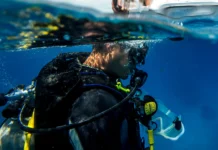Why You Should Ask to See an Instructor’s Qualification Card Before Taking a Scuba Diving Course
Before you jump into the water, ask to see your scuba instructor’s qualification card. It’s a simple step, but it can save you from a lot of trouble. Scuba diving is fun when done right—and it all starts with learning from a qualified instructor.
Not Every Instructor Can Teach Every Course
Not every diver can teach. Only instructors certified by a recognized training agency can teach and certify students. Even then, they must be qualified for the specific course they’re offering. For example, someone might be a certified SSI Open Water Instructor but not allowed to teach Deep Diving or the Instructor Training Course So, it’s not just about being an instructor—it’s about being qualified for your course. You should always ask to see your scuba instructor’s qualification card and check that it is actually for the program you are doing.
Renewal Matters
That’s not all. Instructors and Divemasters must renew their status every year with their training organization. Why? Because standards change. Safety protocols improve.If someone hasn’t renewed, they must not teach or assist in any way. Even worse, they have no insurance coverage. That’s a big deal, especially if something goes wrong.
The New Digital Cards Help You Spot This
Luckily, it’s easier than ever to check if an instructor is current. Most training agencies now issue digital pro cards but the app allows you to see their status. The PADI app lets you check a PADI Pro’s status by entering their pro number in the “Pro Check” feature. The MySSI app displays an SSI Pro’s status directly in the Pro section, which all SSI professionals are required to use. They can access it by tapping the “Pro” button located just below the instructor details on the home page.
Know the Difference: Divemaster vs Instructor
There’s also a clear difference between a Divemaster and an Instructor. A Divemaster can guide certified divers and assist an instructor, but they can’t teach or certify students. Unfortunately, some people blur that line or mislead students. That’s where problems start.
Real Cases, Real Consequences
Recently, we’ve met customers who thought they were certified. They showed up with cards supposedly issued by a local dive center. But when we checked, things didn’t add up. It turned out their “instructor” was actually an unrenewed Divemaster. In some cases, someone else who didn’t even teach the course signed off the certification. That’s not just dishonest—it’s dangerous.
Invalid Certifications = Big Headaches
Your certification should mean something.You should earn it through proper training with a qualified, active instructor. If your instructor hasn’t renewed or isn’t certified to teach the course, your certification might not be valid. Dive shops and resorts can refuse to recognize it. That means you may have to retake the whole course—from the beginning.
Ask Before You Dive
So what should you do? Just ask. Ask to see the instructor’s qualification card. If it’s digital, look for their renewal status. Check that they’re active and qualified to teach the specific course. If they hesitate or make excuses, walk away.
Your safety, your time, and your money all matter. Make sure your certification is real. Make sure your instructor is legit. It only takes a minute to check, but it makes all the difference once you’re underwater.





































